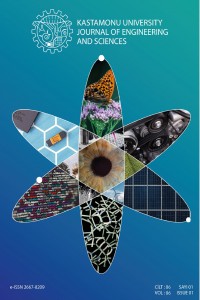Abstract
This study is aimed at ascertaining the per capita generation and characterization of waste in Makurdi metropolis. The study population consisted of all the residents in the households of the selected study areas. Sample sizes of 60 households were selected purposively from three (3) residential areas in Makurdi metropolis which includes Wadata (low income areas), High Level (medium income areas), and Judges Quarters (high income areas). Field observations, secondary data and key informant interviews were also used. Simple random sampling and analysis of solid waste from specific sources (Households) was used for waste characterization whereas house-to-house weight analysis method was used to quantify the waste. The solid waste generation rate in the areas which the survey was conducted revealed that a total sample waste load of 1185.95 Kg was weighed for the three areas. From the analysis of the primary data gathered on the samples of solid waste generated, the order of waste generated is as follows; organic waste (81.30 %) ˃ ash/sand (5.86 %) ˃ Paper (2.78 %) ˃ Metal/Tin (2.03 %) ˃ Bag/Shoes (1.84 %) ˃ Leather (1.74 %) ˃ textiles (1.47 %) ˃ Plastic (1.24 %) ˃ glass/ceramics (0.41 %). The average per capita generation rate was also estimated to be 0.45 kg/ capita/ day with an average house hold size of 6 persons.
Supporting Institution
Nil
Thanks
Thanks goes to the Journal for availing Us the opportunity to put our work for publication.
References
- [1] Amadi, A. N. (2010). Effects of urbanization on groundwater quality: A case study of Port-Harcourt, Southern Nigeria. Natur. Appl. Sci. J., 11(2), 143-152.
- [2] Nnaji, C. C. (2015),"Status of municipal solid waste generation and disposal in Nigeria", Management of Environmental Quality: An International Journal, 26(1): 53 – 71.
- [3] Giusti, L. (2009). A Review of Waste Management Practices and Their Impact on Human Health, Waste Management, 29(8); 2227-2239. doi:10.1016/j.wasman.2009.03.028
- [4] Arvind, K. JHA., Singh, S. K., Singh, G. P., and Prabhat, K. G. (2011). Sustainable Municipal Solid Waste Management in Low Income Group of Cities: A Review. Tropical Ecology, 52(1): 123 – 131.
- [5] Kum V, Sharp A, Harnpornchai N. (2005). Improving the solid waste management in Phnom Penh city: a strategic approach. Waste Management 25(1): 101-109.
- [6] Herat, S. (2009). Electronic waste: an emerging issue in MOEF. 2006. Hazardous Waste: Special Reference to Municipal Solid Waste Management. Electronic publication URL: http://envfor.nic.in/soer/2001/ind_ waste.pdf> (accessed 10.05.20)
- [7] UNU-WIDER (2010), “Solid wastes, poverty and the environment in developing country cities: challenges and opportunities”, Working Paper No. 2010/23, United Nations University World Institute for Development Economics Research, Helsinki.
- [8] Nigeria National Population Commission (2006): 2006 Population and housing Census Enumerator’s Manual. Federal Republic of Nigeria, Abuja.
- [9] United Nations Environment Programme (UNEP) (2009). Converting Waste Plastics into Fuel: Report on Situation Analysis of Existing Solid Waste Management System for Bangkok Metropolitan Administration; International Environmental Technology Centre: Bangkok, Thailand, p. 40.
- [10] Samuel, M. M., Davou, D. D., Juliet, D. D and Ruth, A. N. (2016). Environmental Hazards of Continued Solid Waste Generation and Poor Disposal in Municipal Areas of Nigeria. Journal of Geography, Environment and Earth Science International. 6 (3): 1 – 10.
- [11] Solomon, U. U (2009). The state of solid waste management in Nigeria. Wuhan, Hubei, Department of Environmental Engineering, China University of Geosciences, Wuhan, Hubei.
Abstract
References
- [1] Amadi, A. N. (2010). Effects of urbanization on groundwater quality: A case study of Port-Harcourt, Southern Nigeria. Natur. Appl. Sci. J., 11(2), 143-152.
- [2] Nnaji, C. C. (2015),"Status of municipal solid waste generation and disposal in Nigeria", Management of Environmental Quality: An International Journal, 26(1): 53 – 71.
- [3] Giusti, L. (2009). A Review of Waste Management Practices and Their Impact on Human Health, Waste Management, 29(8); 2227-2239. doi:10.1016/j.wasman.2009.03.028
- [4] Arvind, K. JHA., Singh, S. K., Singh, G. P., and Prabhat, K. G. (2011). Sustainable Municipal Solid Waste Management in Low Income Group of Cities: A Review. Tropical Ecology, 52(1): 123 – 131.
- [5] Kum V, Sharp A, Harnpornchai N. (2005). Improving the solid waste management in Phnom Penh city: a strategic approach. Waste Management 25(1): 101-109.
- [6] Herat, S. (2009). Electronic waste: an emerging issue in MOEF. 2006. Hazardous Waste: Special Reference to Municipal Solid Waste Management. Electronic publication URL: http://envfor.nic.in/soer/2001/ind_ waste.pdf> (accessed 10.05.20)
- [7] UNU-WIDER (2010), “Solid wastes, poverty and the environment in developing country cities: challenges and opportunities”, Working Paper No. 2010/23, United Nations University World Institute for Development Economics Research, Helsinki.
- [8] Nigeria National Population Commission (2006): 2006 Population and housing Census Enumerator’s Manual. Federal Republic of Nigeria, Abuja.
- [9] United Nations Environment Programme (UNEP) (2009). Converting Waste Plastics into Fuel: Report on Situation Analysis of Existing Solid Waste Management System for Bangkok Metropolitan Administration; International Environmental Technology Centre: Bangkok, Thailand, p. 40.
- [10] Samuel, M. M., Davou, D. D., Juliet, D. D and Ruth, A. N. (2016). Environmental Hazards of Continued Solid Waste Generation and Poor Disposal in Municipal Areas of Nigeria. Journal of Geography, Environment and Earth Science International. 6 (3): 1 – 10.
- [11] Solomon, U. U (2009). The state of solid waste management in Nigeria. Wuhan, Hubei, Department of Environmental Engineering, China University of Geosciences, Wuhan, Hubei.
Details
| Primary Language | English |
|---|---|
| Subjects | Engineering |
| Journal Section | Research Articles |
| Authors | |
| Publication Date | June 25, 2020 |
| Submission Date | May 11, 2020 |
| Published in Issue | Year 2020 Volume: 6 Issue: 1 |


